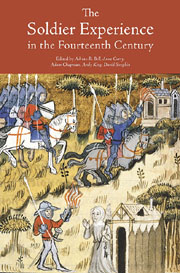Book contents
- Frontmatter
- Contents
- List of Contributors
- List of Abbreviations
- Introduction
- 1 Military Service and the Dynamics of Recruitment in Fourteenth-Century England
- 2 Total War in the Middle Ages? The Contribution of English Landed Society to the Wars of Edward I and Edward II
- 3 A Warlike People? Gentry Enthusiasm for Edward I's Scottish Campaigns, 1296–1307
- 4 Edward I's Centurions: Professional Soldiers in an Era of Militia Armies
- 5 Who's afraid of the Big Bad Bruce? Balliol Scots and ‘English Scots’ during the Second Scottish War of Independence
- 6 Rebels, Uchelwyr and Parvenus: Welsh Knights in the Fourteenth Century
- 7 Breton Soldiers from the Battle of the Thirty (26 March 1351) to Nicopolis (25 September 1396)
- 8 Towards a Rehabilitation of Froissart's Credibility: The Non Fictitious Bascot de Mauléon
- 9 The English Reversal of Fortunes in the 1370s and the Experience of Prisoners of War
- 10 The Soldier, ‘hadde he riden, no man ferre’
- Index
- Warfare in History
Introduction
Published online by Cambridge University Press: 05 February 2013
- Frontmatter
- Contents
- List of Contributors
- List of Abbreviations
- Introduction
- 1 Military Service and the Dynamics of Recruitment in Fourteenth-Century England
- 2 Total War in the Middle Ages? The Contribution of English Landed Society to the Wars of Edward I and Edward II
- 3 A Warlike People? Gentry Enthusiasm for Edward I's Scottish Campaigns, 1296–1307
- 4 Edward I's Centurions: Professional Soldiers in an Era of Militia Armies
- 5 Who's afraid of the Big Bad Bruce? Balliol Scots and ‘English Scots’ during the Second Scottish War of Independence
- 6 Rebels, Uchelwyr and Parvenus: Welsh Knights in the Fourteenth Century
- 7 Breton Soldiers from the Battle of the Thirty (26 March 1351) to Nicopolis (25 September 1396)
- 8 Towards a Rehabilitation of Froissart's Credibility: The Non Fictitious Bascot de Mauléon
- 9 The English Reversal of Fortunes in the 1370s and the Experience of Prisoners of War
- 10 The Soldier, ‘hadde he riden, no man ferre’
- Index
- Warfare in History
Summary
There are few areas of medieval studies that have flourished so much in recent years as military history. This volume represents a further flowering. The seeds of its contents were sown at a conference held at the ICMA Centre, University of Reading, in July 2009. They germinated there thanks to the energetic discussion of all participants, have subsequently been nurtured and pruned by reviewers, and are now presented in full bloom as significant contributions to the study of the individual soldier in the fourteenth century.
From the outset, our intention had been to invite contributors carrying out grass roots research in archival, as opposed to chronicle, sources, so that the conference and any publications would be genuinely new and ground-breaking. This was a natural development of our own research project under the auspices of which the conference was held – ‘The Soldier in Later Medieval England’. This project was funded by the Arts and Humanities Research Council (AHRC) for three years from 2006, with Adrian Bell and Anne Curry as co-investigators, Andy King and David Simpkin as research assistants, and Adam Chapman as doctoral student. Our aim was to produce an on-line searchable database of all soldiers known to have served the English crown between 1369 and 1453. This information was collected from a vast array of muster and retinue rolls held in English and French archives, and from the letters of protection and attorney which some soldiers took out to protect their domestic interests during their military service.
- Type
- Chapter
- Information
- The Soldier Experience in the Fourteenth Centur , pp. 1 - 8Publisher: Boydell & BrewerPrint publication year: 2011



